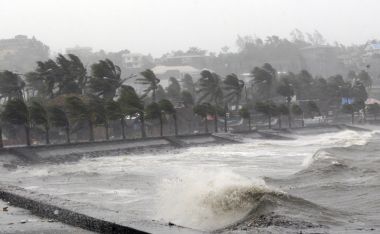Typhoon Hagupit: At least 21 reported dead

At least 21 people were reported dead, many of them drowned as flood waters rose in Borongan, the main town in Eastern Samar, where typhoon Hagupit made first landfall, the Philippine National Red Cross said on Monday.
The Philippines had evacuated more than a million people as the powerful typhoon approached the country from the Pacific, fearing a repeat of a super storm last year that left more than 7,000 dead or missing.
"We have confirmed reports that 21 people died in Eastern Samar, 16 of them in Borongan," said Gwendolyn Pang, secretary-general of the Philippine National Red Cross.
The National Disaster Risk Reduction and Management Council in Manila confirmed only two dead and three injured. Two others were reported killed outside Samar, the third largest island in the Philippines, since Hagupit hit on Saturday night.
On Monday, hundreds of thousands were returning home. More than a million people had taken shelter in evacuation centres across the central belt of the archipelago over the weekend to escape the fury of the Category 3 storm.
A year ago, Category 5 "super typhoon" Haiyan tore through the central Philippines leaving more than 7,000 dead or missing. This time the authorities evacuated whole towns and villages in coastal and landslide prone areas.
"We're happy that we've learned our lessons from our past experiences. This is a good sign," said Gwendolyn Pang, secretary general of the Philippine Red Cross.
Hagupit roared in from the Pacific on Saturday night, churning across Samar island and on to the smaller island of Masbate. Its effects were felt across the central Philippines, including Leyte island and the south of the main island Luzon.
Despite the relief, a major operation remained to clear debris and get supplies to people left homeless or without power after the typhoon flattened houses and tore down power lines.
Delia Monleon, mayor of Jipapad, a town of 7,000 people in Eastern Samar province, said floodwaters were still preventing people from getting to their homes.
"Our problem is power, food is a problem because boats cannot leave," said Monleon. "It was flooded yesterday so we can't leave to look for food," she said.











